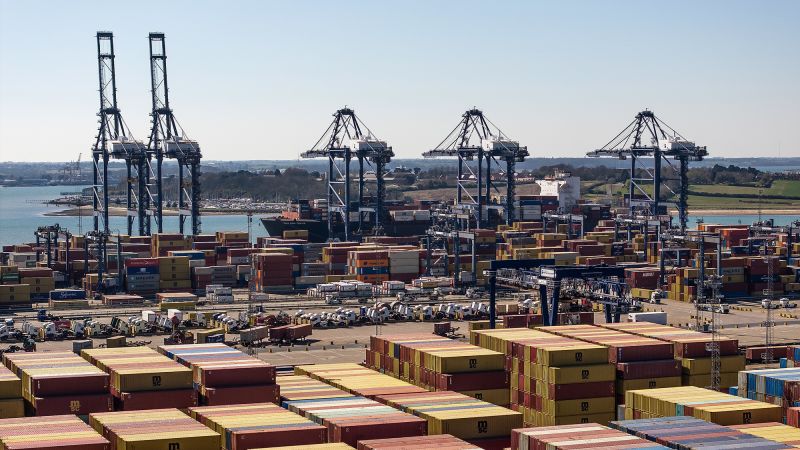In April, Britain witnessed a significant contraction in its economy, the most pronounced decline in nearly two years. This downturn coincided with President Donald Trump’s imposition of tariffs, which substantially affected the UK’s exports of goods to the United States, leading to a historic drop. According to the Office for National Statistics, the gross domestic product (GDP) of Britain shrank by an estimated 0.3% in April, following a modest expansion of 0.2% in March. This marks the steepest month-on-month decline since October 2023, signaling troubling economic trends for the UK amid rising trade tensions globally.
The primary driver of this economic reduction was a notable contraction in the services sector. Analysts pointed out that the erosion was exacerbated by the government’s recent decision to eliminate a tax incentive for certain home buyers, which led to reduced consumer spending and investment in housing. However, it was the broader implications of President Trump’s trade policies that significantly influenced the economic landscape during this period. The trade war initiated by the United States has contributed to increasing doubts and uncertainties among businesses operating in the UK, further undermining economic confidence.
Rachel Reeves, the British finance minister, characterized April as a “challenging month” in an interview with Sky News. She noted the considerable uncertainty surrounding tariff policies, which played into the weaker GDP figures. Reeves emphasized that a detailed analysis of the GDP data reveals significant weakness in both exports and production, linked directly to global uncertainties and the tariffs implemented by the Trump administration.
Adding to the disturbing trends, the value of UK exports to the US plummeted by £2 billion (approximately $2.7 billion) in April compared to March, marking the most significant decrease since records began in 1997. The Office for National Statistics pointed out that this decline was “likely linked to the implementation of tariffs” on goods exported from the UK to the United States. On April 2, President Trump announced a series of new tariffs across various sectors, including a baseline 10% levy on goods exported to the US and country-specific reciprocal tariffs, though the implementation of these tariffs was postponed until early July. Additionally, he introduced new tariffs on imports of steel, aluminum, and car components.
Despite facing tariffs, Britain appeared to have escaped relatively unscathed compared to other trading partners. The UK only faced the 10% basic tariff while avoiding harsher measures such as tariffs on steel and aluminum imports. Importantly, the UK was the first country to negotiate a trade framework with the Trump administration, which included an arrangement to reduce tariffs on British cars, reflecting some level of diplomatic success amidst broader trade disputes.
Nevertheless, the overall economic consequences of these tariffs and their unpredictable application have created an atmosphere of uncertainty that weighs heavily on British businesses and consumers. Yael Selfin, Chief Economist at consultancy KPMG UK, highlighted that the provisional accord between the US and the UK offers a measure of policy certainty for British firms. Still, the tariffs on UK exports to the US remain elevated compared to pre-April levels, posing ongoing challenges for trade.
In her analysis, Selfin projected that these heightened tariffs would act as a hindrance to UK trade in the medium term, suggesting that businesses might need to adapt to a trade environment defined by higher operational costs and unpredictable market conditions. The complex interplay of local economic policies and international trade relations underlines how deeply interconnected the global economy has become and emphasizes the importance of continuously monitoring these developments for their potential impact on Britain’s economic future. Overall, the economic indicators suggest that the ripple effects of tariff wars and trade policies will continue to define the landscape for UK businesses and consumers alike.



